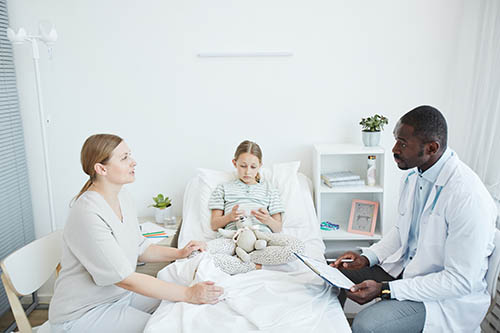OH NO! Time for an Emergency Department Visit by Dr. Nick Robell
A trip to the Emergency Department (ED) is something many parents will experience at some point with their children. I hope this article will help prepare you for what to expect. Everyone’s emergency is unique. Nothing is too big or too small. Emergencies seem to happen at the most inconvenient times – on vacation, late at night, early in the morning, on weekends.
The ED is open 24 hours a day and 365 days a year. Across the country, EDs are safety nets for anyone who needs them. No person who has an emergency can be turned away without an evaluation. That is against the law. And you should never feel guilty for seeking emergency care.
When you decide to seek care for an acute illness and you are not dialing 911, you have options. Along with the typical hospital-based ED, there are Specialty Emergency Departments, Free-Standing Emergency Departments and Urgent Care centers.
Urgent Care (UC) centers are different. Urgent Care centers are smaller, have fewer resources and are not typically open 24 hours a day. Generally care is faster compared to an ED but there may not be a physician on-site.
X-rays, nasal/ throat swabs, urine testing and limited blood work can be done at most UCs. Rashes, runny noses, coughs, minor injuries, and cuts can all be managed at an Urgent Care Center.
Chest pain, difficulty breathing, abdominal pain and most neurological complaints should be seen at an ED since CT scans, ultrasounds and comprehensive blood testing cannot be performed at an UC. Larger hospital based EDs have more resources but depending on volume of patients, may have longer wait times.
Obviously, depending on your location you may not have a choice in the type of acute care facility. If you have time to decide, an UC may be a better option for you. These facilities can save time, money and you still receive high quality care.
WHEN TO SEEK CARE
I would err on the side of caution always and seek care if you are unsure. If you are on the fence, you have resources. Many pediatricians and physician offices have on-call services. You will speak with a nurse or a triage provider initially. Many times, a provider can give advice or expedite care as an outpatient.
For certain things like gynecological, dental or eye-related issues you may be able to call local clinics and be seen the next day or the same day. The 911 operator can even provide advice as well. Ultimately, if you do not feel comfortable with your loved one at home, seek care.
PREPARE FOR THE ED OR UC
Prior to bringing your child, please consider giving medications for pain or fever such as ibuprofin or acetaminophen. Bring items to keep them occupied. You may bring food and beverages but check with the nurse beforehand. If there is a chance your child may need surgery, eating can delay this.
Common questions we ask about your child include vaccination history, last dose of acetaminophen or ibuprofen, and allergies. If your child is under the age of 2, you should know how many wet diapers and stools in a day, along with details regarding the pregnancy with and birth of that child. Please be prepared with this information.
HOW DOES THE PROCESS LOOK
When you arrive, you will initially be seen by a triage provider. That person will gather your child’s vital signs, basic information, and some details about your reason for coming that day. Based on this information, the triage provider will assign your child an acuity level. Higher acuity patients will be moved out of the triage area sooner to be seen. Once you and your child has been seen and evaluated, testing and treatment may be recommended.
If you have questions, ask them. If you have a specific concern, please mention this as soon as possible. You should understand the rationale for every action made by the nurses, techs or the physician, and you should be able to explain what happened at the ED to someone else.
We want to make sure you understand and are comfortable with the plan. Physicians make recommendations but ultimately the patient and family need to agree to the plan. You always have the right to decline any recommendations.
After services are completed, a decision is made regarding next steps i.e., your child may be discharged home, admitted to the hospital or transferred to another hospital. Often you will be advised to follow-up with your child’s pediatrician after discharge.
Unfortunately, many patients leave the ED without a concrete diagnosis. This can be frustrating but is very common. As physicians, we commonly exclude things like a urinary tract infection or appendicitis however, there are no perfect tests in medicine. Disease processes may be developing, and the diagnosis can be missed early even with the gold standard test.
Even though you are being discharged, please remember that processes develop over time and do not dismiss ongoing pain or progressive symptoms. Most pediatric patients do very well after visits to the EDs and ultimately are discharged home. As Emergency Physicians, we are here to help and many of us are parents too. ❦
 About the Author
About the Author
My name is Nick Robell. I am an Emergency Medicine physician in west Michigan. Including my residency, I have worked in three different states and across all kinds of Emergency Departments. I have worked in nearly every setting, large urban hospitals, suburban and rural ones too. I have also worked in sub-specialty hospitals, community Emergency Departments, Free-Standing Emergency Departments and even Urgent Care Centers.
My wife and I have two wonderful girls, Josie (4) and Charlotte (2). They have big personalities, and neither is shy about telling their physician parents what to do. My hope with this article is to help you navigate life’s little emergencies and a visit to the Emergency Department.
